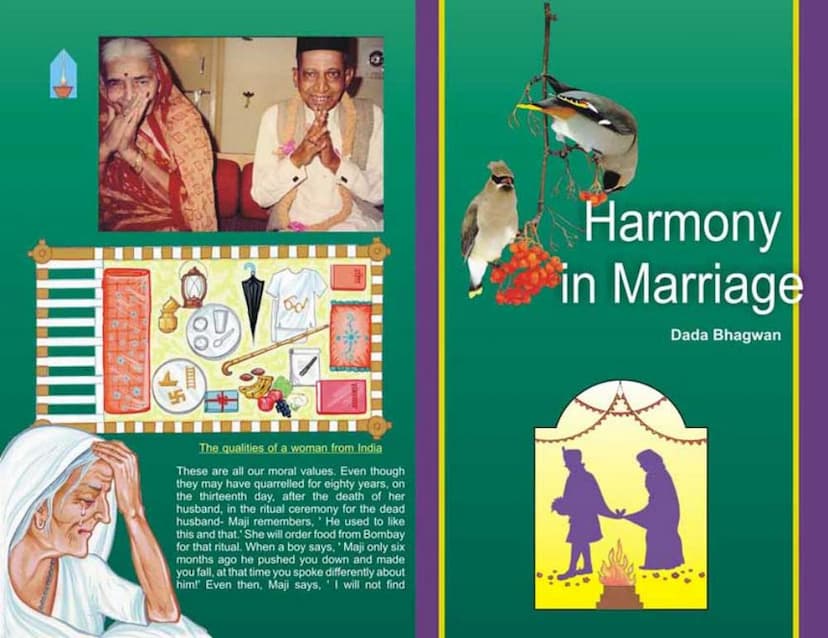Harmony In Marriage
Added to library: September 1, 2025

Summary
Here's a comprehensive summary of the Jain text "Harmony in Marriage" by Dada Bhagwan, based on the provided pages:
Overall Theme:
The book "Harmony in Marriage" by Dada Bhagwan, a spiritual teacher and proponent of Akram Vignan (a spiritual path of self-realization), offers practical and profound guidance on achieving harmony and understanding within marriage. The central message emphasizes self-improvement, mutual respect, and the importance of spiritual awareness to overcome marital conflicts and lead a fulfilling life. Dada Bhagwan draws from his own experiences and answers questions from individuals and couples to provide clarity and solutions to the complexities of married life.
Key Concepts and Teachings:
- The Essence of Harmony: Harmony in marriage is not about always agreeing, but about managing differences with understanding and love. It requires a conscious effort to avoid clashes and cultivate a positive environment at home.
- Avoiding Clashes: The primary cause of marital discord is identified as ignorance, ego, and a lack of understanding of oneself and the other person. Dada Bhagwan repeatedly stresses the need to eliminate anger, pride, attachment, and greed, which fuel conflicts.
- Trivial Matters: Many quarrels arise from minor issues like food preferences, household chores, or perceived slights. The advice is to let go of these trivialities, adjust, and prioritize peace over being right.
- The "Tug-of-War": Marital conflicts are likened to a tug-of-war. The wise person, understanding the futility of the struggle, lets go of the rope to prevent it from breaking.
- Pratikraman: The practice of pratikraman (self-reflection, repentance, and resolution to not repeat mistakes) is presented as a powerful tool to dissolve past karmic baggage and prevent new conflicts.
- Understanding Each Other: True understanding of one's spouse is only possible after attaining self-knowledge (Atmagnan) from a Gnani Purush. Before that, relationships are based on ego and superficial perceptions.
- The Role of Husband and Wife:
- Husbands: Are encouraged to be understanding, loving, and supportive, rather than dominating or bossy. They are advised to avoid unnecessary criticism, especially of their wife's cooking or domestic efforts. Husbands are urged to be the first to initiate reconciliation after a disagreement.
- Wives: Are seen as inherently nurturing and the source of warmth in the home. While women are described as having more deceit and moha (attachment) in their nature, they are also capable of immense love and sacrifice. They are encouraged to be sincere and supportive of their husbands.
- Love vs. Attachment: True love is unwavering and not conditional on external actions or possessions. Attachment, on the other hand, is selfish and leads to expectations, accusations, and suffering. The goal is to cultivate pure love, which is free from ego and possessiveness.
- The Nature of Marriage: Marriage is viewed as a partnership and a karmic account to be settled. It's a significant worldly interaction that requires careful navigation. The concept of "mine and yours" leads to conflict; a more harmonious approach involves focusing on "ours."
- Self-Improvement: The emphasis is always on improving oneself rather than trying to change the other person. By transforming one's own perspective and reactions, the external situation naturally improves.
- Akram Vignan and Gnan: The path of Akram Vignan, as taught by Dada Bhagwan, provides the means to attain self-knowledge (Gnan). This knowledge allows individuals to see the true nature of the Self and the world, leading to detachment and inner peace, which are essential for marital harmony.
- The Importance of Forgiveness: Both husband and wife must be willing to forgive and seek forgiveness. This process of mutual understanding and forgiveness is crucial for maintaining peace and resolving conflicts.
- Children and Marriage: The impact of parental conflicts on children is highlighted as detrimental. It's advised to maintain harmony at home for the well-being of the children.
- Divorce: Divorce is generally discouraged, especially if children are involved. The emphasis is on enduring and adjusting within the marriage, even if it's challenging, to settle karmic accounts.
- Sincerity and Faithfulness: Sincerity in thoughts, speech, and actions towards one's spouse is paramount. Infidelity and lack of sincerity create significant karmic consequences.
- Role of Women: While acknowledging certain societal perceptions and innate tendencies of women, Dada Bhagwan elevates their potential, calling them "Goddesses of strength" and capable of liberating the world with their energy. He encourages men to treat women with reverence and respect.
- The Divine Within: Ultimately, the teachings point towards recognizing the Pure Soul within oneself and within one's spouse, which is the foundation of true love and lasting harmony.
Structure and Style:
The book is presented as a collection of dialogues and question-and-answer sessions between Dada Bhagwan and his followers. The language is simple, direct, and often uses analogies and real-life examples to illustrate spiritual principles. The conversational style makes the profound teachings accessible and practical for everyday application.
In essence, "Harmony in Marriage" is a spiritual guide that seeks to transform marital relationships by fostering self-awareness, unconditional love, and a deep understanding of the underlying karmic principles governing human interactions.